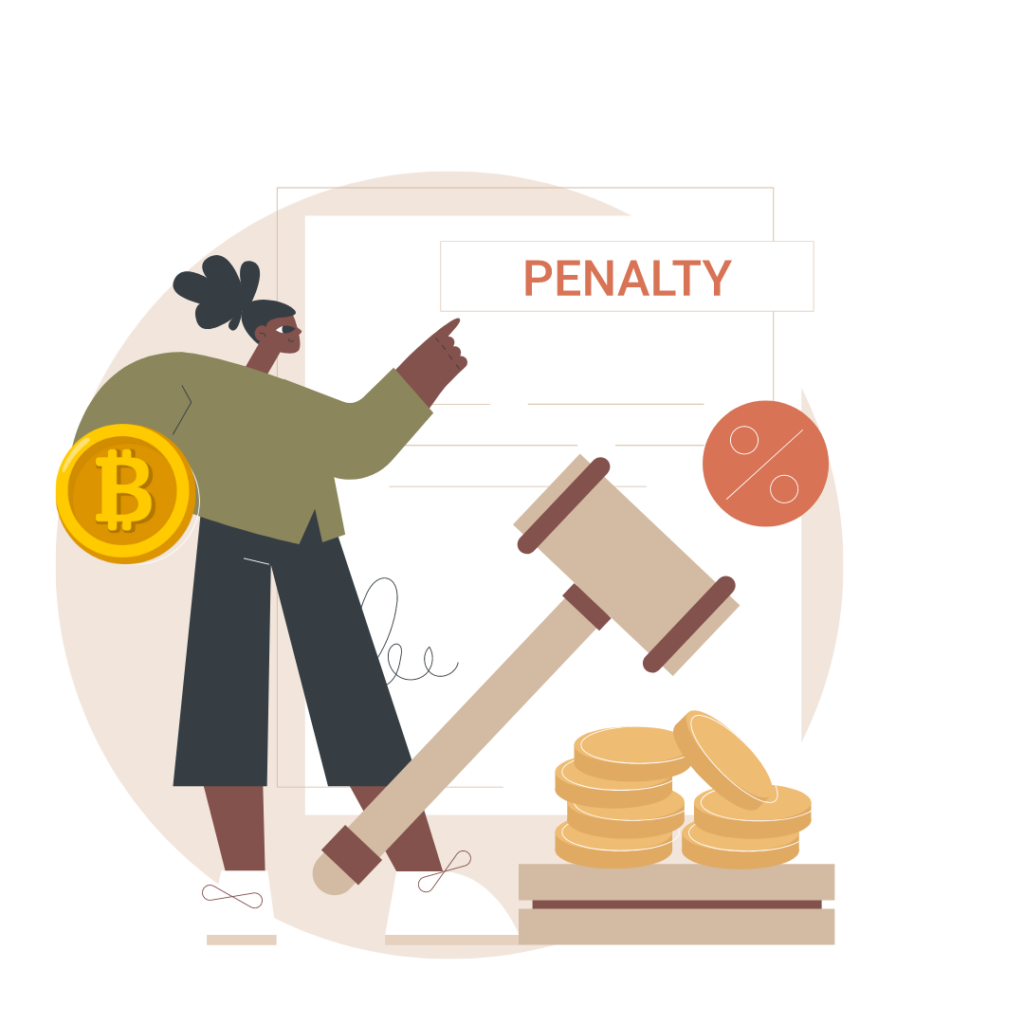Crypto Tax Penalties in the US: In-Depth Guide
Crypto tax penalties are fines you pay if you don’t file your tax return or pay your taxes correctly or on time. Not clearing your penalties on time can further accrue interest over time, leading to significant tax liabilities.
That is why crypto investors and traders in the United States must stay informed about how crypto tax penalties work. In this guide, we will explore everything you need to know about crypto tax penalties in the US, from how crypto is taxed to the most common penalties and practical strategies to avoid them (legally).
How is Crypto Taxed in the US?

In the US, crypto taxes primarily fall into two categories – capital gains taxes and income taxes.
Capital Gains Taxes: When you buy, sell, or trade cryptocurrencies, you may incur capital gains or losses.
Since the IRS treats crypto as property, these gains are taxed at either the short-term capital gains rate (ranging from 10% to 37%) or the long-term capital gains rate (ranging from 0% to 20%), depending on the holding period.
Furthermore, the IRS allows you to offset capital losses against gains from crypto and other investments.
Income Taxes: If you receive crypto earnings as payment for services, products, or as rewards from mining and staking, they are subject to ordinary income tax.
To ensure compliance, you must report your crypto gains on Schedule D (Form 1040) and Form 8949. Crypto received as income, on the other hand, must be reported on Schedule 1 (Form 1040) or Schedule C (Form 1040).
For a comprehensive and detailed understanding of crypto taxation in the US, refer to our extensive guide on US crypto taxes.
When Do You Owe a Crypto Tax Penalty to the IRS?
There are many scenarios when you might owe crypto tax penalties to the IRS. However, they all roughly fall into one (or more than one) of these four categories:
Missing Tax Deadline: You could face penalties if you don’t file your crypto taxes by the deadline. Usually, the tax deadline falls on April 15th, but it can vary. Check the tax deadline for the current year and ensure time tax reporting.
Failing to Pay Owed Taxes on Time: If you owe taxes on your crypto gains and don’t pay them on time, the IRS can impose penalties and interest on unpaid taxes. It’s essential to calculate your tax liability accurately and make timely payments.
Underreporting Gains and Income: Providing inaccurate information about your crypto gains or not reporting them at all can lead to penalties. The IRS requires accurate and complete reporting of your crypto activities.
Failing to Provide Accurate and Timely Information Returns: If you’re involved in certain crypto transactions, like selling crypto on an exchange, you may need to provide information returns. Failing to do this accurately and on time can result in penalties.
Avoiding these situations and ensuring you meet your tax obligations is crucial to steer clear of IRS penalties.
How to Calculate your Crypto Tax Penalties and Interests?
There are a total of 11 types of penalties listed by the IRS:
- Information Return
- Failure to File
- Failure to Pay
- Accuracy-Related
- Erroneous Claim for Refund or Credit Penalty
- Failure to Deposit
- Tax Preparer Penalties
- Dishonored Checks
- Underpayment of Estimated Tax by Corporations
- Underpayment of Estimated Tax by Individuals
- International Information Reporting
However, out of these eleven, only the following three are the most common when it comes to crypto tax penalties in the US.

1. Failure to File Penalty:
The Failure to File penalty applies when you don’t submit your crypto tax return by the deadline.
Percentage-Based Penalty: The IRS imposes a penalty of 5% of the unpaid taxes for each month or part of a month your return is late. This penalty can accumulate for up to five months and 25% of the unpaid tax amount.
Minimum Penalty: If your return is 60 days overdue, the IRS enforces a minimum penalty of $435 or 100% of the unpaid tax, whichever is less. So, even if you owe relatively less taxes, it could mount to a more significant liability if you don’t file your return for an extended period.
Example: Suppose you owe $5,000 in taxes on your crypto gains, and you fail to file your tax return for four months after the deadline. Your penalty would be 20% of $5,000, which equals $1,000, in addition to any interest charges.
2. Failure to Pay Penalty:
The Failure to Pay penalty applies when you owe taxes on your crypto gains but don’t pay them by the tax deadline.
Percentage-Based Penalty: The penalty rate is 0.5% of the unpaid tax amount for each month or part of a month the tax remains unpaid. Like the Failure to File penalty, this penalty can accumulate up to a maximum of 25%.
Note that if you owe both the Failure to File and Failure to Pay fines in the same month, the IRS will generally reduce the Failure to File penalty by the amount of the Failure to Pay penalty.
So, if you owe a 5% Failure to File penalty on unpaid taxes and a 0.5% Failure to Pay penalty, your Failure to File penalty will reduce to 4.5%.
3. Accuracy-Related Penalty:
The Accuracy-Related penalty applies when you provide inaccurate or incomplete information on your crypto tax return. The IRS levies a penalty of 20% of the underpayment of tax resulting from the inaccuracies on your tax return. This penalty can apply if you fail to report income, understate your tax liability, or overstate deductions or credits.
Interest
In addition to penalties, the IRS also charges interest on unpaid taxes. The interest rate is not fixed and usually changes quarterly. To calculate your total crypto tax penalties and interest, you must consider the specific circumstances of your crypto tax situation, the duration of non-compliance, and whether the IRS sent you a notice of intent to levy.
The IRS provides ample guidance and tools to help you estimate these amounts accurately. Moreover, use this free tool to calculate your penalties and interests based on your specific circumstances.
How to Legally Avoid Penalties on Crypto Taxes?
Do everything you can to avoid these penalties in the first place. However, if you DO find yourself facing penalties and interests, here are some options you have to tackle the situation.
Apply for a Payment Plan
If you can’t pay all your taxes at once, don’t worry. The IRS allows you to set up a payment plan. A payment plan allows you to pay off your owed taxes in manageable installments over time. However, depending on your payment plan, you may (or may not) still accrue penalties and interest.
Request Penalty Relief
Sometimes, the IRS may grant penalty relief, particularly if you can demonstrate that your failure to file or pay on time was due to reasonable cause and not willful neglect. You can write a letter explaining your situation and ask for this relief when you file your taxes.
Dispute Your Crypto Tax Penalty
If you think the IRS made a mistake and unfairly charged you a penalty, you have the right to dispute it. But only proceed if you are confident that the IRS has made a mistake, as unsubstantiated disputes can lead to additional complications.
The staking rewards lawsuit between the Jarretts and the IRS is a real-world example of disputing crypto tax penalties.
Other than these, here are some steps you can take to minimize your chances of triggering crypto tax penalties:
Apply for Tax Extensions
If you need more time to prepare your crypto tax return, consider filing for a tax extension. The crypto tax extension will grant you an additional six months to complete and file your return. But remember, it doesn’t give you more time to pay your taxes. You still need to estimate and pay what you owe by the original deadline to avoid penalties.
Check out our step-by-step guide on filing tax extensions for your crypto earnings.
Amend Your Crypto Tax Return
If you realize you made errors on your previous tax returns or failed to report crypto income, consider amending your returns using Form 1040-X. It’s better to correct mistakes as soon as you find them to avoid more penalties and interest.
Check out our step-by-step guide on amending your crypto tax return.
Use Crypto Tax Software
Consider utilizing crypto tax software, like Bitcoin.Tax, to streamline the tax reporting process. These tools can automatically import your transaction data from exchanges and wallets, calculate your tax liability, and generate the necessary tax forms. Using such software can help ensure accuracy and compliance with IRS regulations, reducing the risk of penalties.
By following these steps and taking a proactive approach to your crypto tax responsibilities, you can legally avoid penalties while maintaining good standing with the IRS.
Remember that timely and accurate reporting, along with communication with the IRS when necessary, is key to a successful tax experience when dealing with crypto gains and earnings.